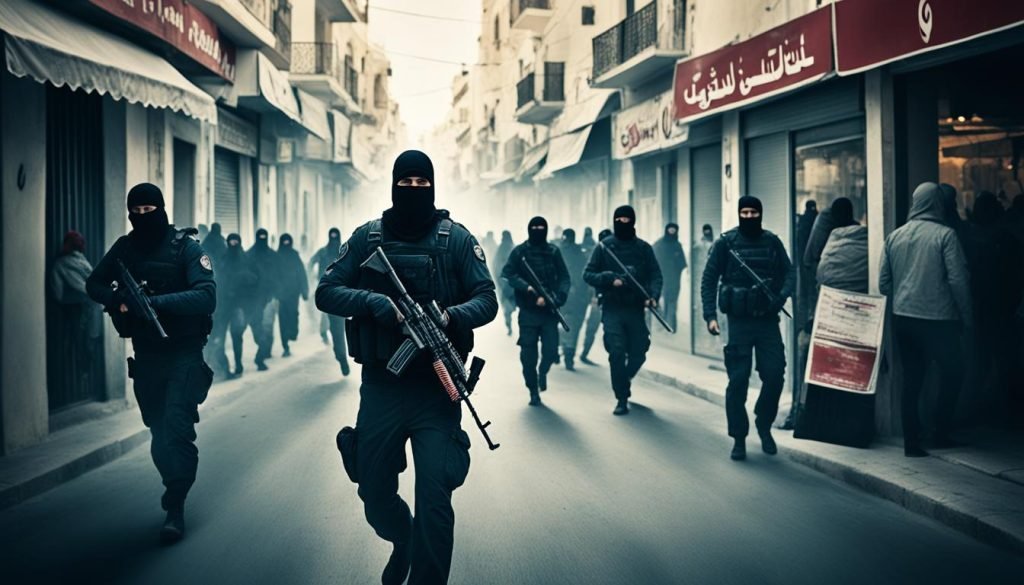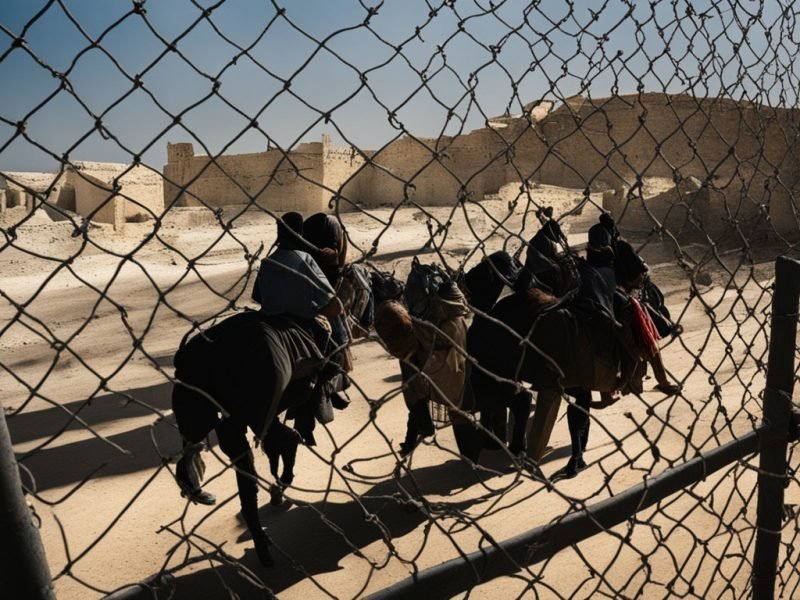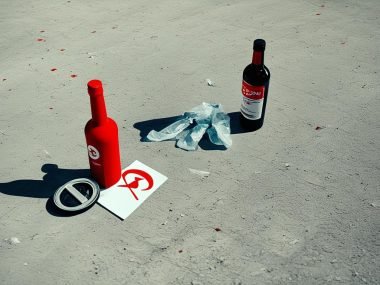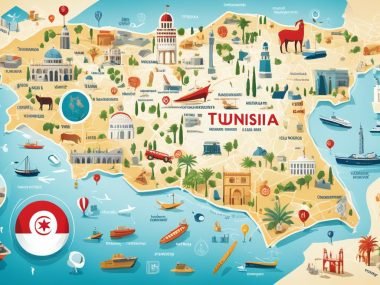Since a terrorist attack on a police bus in 2015, Tunisia has faced Tunisia safety concerns. It is under a state of emergency. The UK’s Foreign, Commonwealth & Development Office (FCDO) warns travellers, especially about border areas. The threat of terrorism remains, aiming at local and global interests. Security forces in Tunisia are always on alert.
Crime in Tunisia isn’t as common as in other places, but theft happens, mostly in summer. Travellers should stay careful, especially near important buildings and western embassies. Violent demos can happen there. It’s important to have ID with you.
During Ramadan, there are strict rules on selling and drinking alcohol. The roads and driving habits in Tunisia also create danger. This means you need a detailed Tunisia travel risk assessment.
Key Takeaways
- Tunisia has been under a state of emergency since 2015 due to terrorist threats.
- The FCDO advises against travel to regions near the borders with Libya and Algeria.
- Travellers should be vigilant about theft, especially in the summer months.
- Demonstrations can become violent and usually occur near government buildings and western embassies.
- Road conditions and driving practices in Tunisia are risky, raising the potential for traffic accidents.
Understanding Tunisia’s Current State of Emergency
Since a 2015 terrorist attack on a police bus, Tunisia has been in a state of emergency. The UK’s Foreign, Commonwealth & Development Office (FCDO) says this will last until the end of 2024. This leads many to ask: is Tunisia safe for tourists? The country has seen many attacks, affecting its security.

To protect travelers, Tunisia has tightened security. You’ll see more guards and patrols around, especially near the Libyan border. These steps are crucial for Tunisia security precautions. They help keep everyone safe.
Below is a comparative table highlighting the recent and ongoing situations due to the state of emergency:
| Factors | Pre-State of Emergency | Current State of Emergency |
|---|---|---|
| Terrorist Incidents | Fewer in number | Increased frequency |
| Security Measures | Standard police presence | Heightened with multiple checkpoints |
| Travel Advisories | Limited specific warnings | Active advisories against certain regions |
| Tourist Safety | Minimal explicit cautions | Strict Tunisia security precautions |
By understanding the state of emergency and following Tunisia security precautions, tourists can ease their worries. This ensures a safe and enjoyable visit to Tunisia, a country full of history and culture.
Tunisia’s Terrorism Threat
Since 2015, Tunisia has been dealing with terrorism threats. These threats have impacted both locals and tourists. It’s vital to understand these risks if you’re thinking of visiting Tunisia.

Recent Terrorist Attacks
In 2023, Tunisia saw many terrorist attacks. These included armed assaults and stabbings against security forces. These actions caused deaths and injuries, highlighting the ongoing Tunisia terrorism threat. Such incidents occurred in cities like Tunis and tourist spots, including Djerba island.
High-Risk Areas
Areas near the Libyan and Algerian borders are especially dangerous. The Chaambi Mountains National Park is notably risky due to terrorist activities. The UK’s Foreign, Commonwealth & Development Office (FCDO) advises against travelling there. Travellers should follow this Tunisia safety advice.
Knowing about these risks and following safety tips is crucial for safe travel in Tunisia. Staying informed helps visitors enjoy Tunisia safely.
Cautions for Female and LGBT+ Travellers
If you’re travelling to Tunisia and you’re female or LGBT+, you need to be extra careful. Here are some important tips to keep your trip safe and enjoyable.
Female Safety Concerns
Female travellers may encounter problems like sexual harassment or assault. This is especially true in the summer and at night in cities. It also happens in quiet areas of parks and beaches.
To stay safe, dress conservatively and always be aware of your surroundings.
LGBT+ Precautions
In Tunisia, being in a same-sex relationship can lead to serious trouble. The law and some people are against the LGBT+ community. This could mean facing jail time if caught.
To avoid danger, it’s crucial to be very careful and private about your personal life. Following Tunisia security tips is key for LGBT+ travellers.
Safety and Security Tips for Travellers
Travelling to Tunisia can be an adventure. Yet, staying safe and prepared is vital. Here are key tips for a secure visit.
- First, keep an eye on Tunisia safety concerns. Check local news and follow travel advisories to avoid risky areas.
- Next, make sure you have good travel insurance. It’s important for dealing with unexpected events or emergencies.
- Local health measures may be different. Wear masks where necessary and know where to find medical help.
- For getting around, opt for licensed taxis or trusted ride services. Be careful on public transport to avoid petty crime.
- If you’re driving, get an international permit and learn the local rules. Carry an emergency kit for various road conditions.
- In the desert or remote areas, hire licensed guides and get the right permits. It keeps you safe and informed.
- Be careful at military or police checkpoints. Slow down, follow their directions, and have your ID ready.
To reduce risks and enjoy your trip, follow these practical Tunisia safety advice. Preparing properly makes for a smoother journey.
Let’s recap the important Tunisia security tips:
| Tip | Details |
|---|---|
| Stay Informed | Stay up to date with news and advisories. |
| Travel Insurance | Get insurance that covers emergencies. |
| Health Measures | Obey health rules; know local medical facilities. |
| Licensed Transport | Choose safe taxis or services; watch out on public transport. |
| Driving Permits | Have an international permit; follow the roads’ rules. |
| Guides and Permits | Use official guides for desert journeys; secure permits. |
| Checkpoint Caution | Approach checkpoints carefully with your ID. |
These tips are meant to guide you on Tunisia safety concerns, for a trip that’s both secure and fun.
Conclusion
Tunisia invites travellers with its deep history and culture. Yet, we can’t ignore its security issues, like the emergency state and terrorism threats. When thinking about visiting, especially risky areas, these facts are crucial.
It’s vital to assess travel risks in Tunisia. By following official advice and staying safe, you can lower these risks. This involves always having ID, avoiding dangerous places, and respecting local customs, especially during Ramadan.
Tunisia remains open and safe for careful travellers. Stay informed, respect cultures, and prepare well to handle safety concerns. With the right approach, you can have a safe and unforgettable trip. Enjoy Tunisia’s wonders by being smart and prepared.







